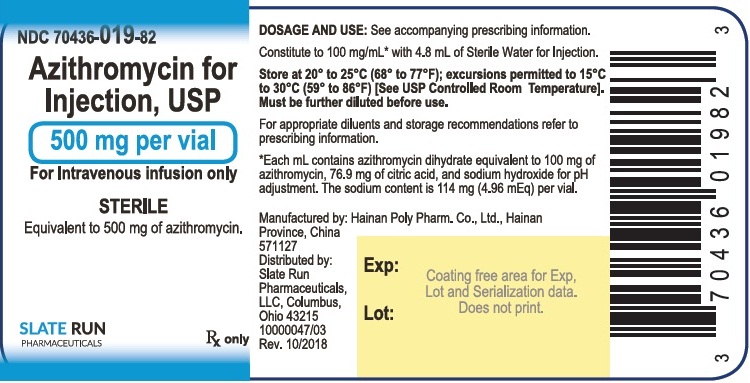Azithromycin Dihydrate Injection, Powder, Lyophilized, For Solution while Breastfeeding

What is Azithromycin Dihydrate Injection, Powder, Lyophilized, For Solution used for?
Is using Azithromycin Dihydrate Injection, Powder, Lyophilized, For Solution safe or dangerous while breastfeeding?

8.3 Nursing Mothers Azithromycin has been reported to be excreted in human breast milk in small amounts. Caution should be exercised when azithromycin is administered to a nursing woman.
Azithromycin Dihydrate Injection, Powder, Lyophilized, For Solution Breastfeeding Analsys
Azithromycin anhydrous while Breastfeeding
SafeCAS Number: 83905-01-5
Excreted in very low levels into breast milk and commonly used for pediatric treatment. Early exposition to Macrolides (mostly Erythromycin) have been related to hypertrophic pyloric stenosis. Avoiding use in the first post-partum month would be advisable yet it may occurred while breastfeeding. Be aware of false negative bacterial cultures in the infant when the mother is on antibiotics. Also, diarrheal disease due to imbalance of intestinal flora is possible.
Azithromycin Dihydrate Injection, Powder, Lyophilized, For Solution Breastfeeding Analsys - 2
Azithromycin anhydrous while Breastfeeding
CAS Number: 83905-01-5
Because of the low levels of azithromycin in breastmilk and use in infants in higher doses, it would not be expected to cause adverse effects in breastfed infants. Monitor the infant for possible effects on the gastrointestinal flora, such as diarrhea, candidiasis (thrush, diaper rash). Unconfirmed epidemiologic evidence indicates that the risk of hypertrophic pyloric stenosis in infants might be increased by maternal use of macrolide antibiotics during breastfeeding. A single dose of azithromycin given during labor to women who were nasal carriers of pathogenic and reduced the counts of these bacteria in breastmilk in one study.
I already used Azithromycin Dihydrate Injection, Powder, Lyophilized, For Solution and meanwhile I breastfed my baby should I be concerned?
It is always a good idea to keep your healthcare provider or doctor informed about your drug usage during pregnancy and breastfeeding but if you have not informed your doctor about Azithromycin Dihydrate Injection, Powder, Lyophilized, For Solution and have used it then do not panic as Azithromycin Dihydrate Injection, Powder, Lyophilized, For Solution is mostly safe in breastfeeding and should not cause any harm to your baby.
My doctor has prescribed me Azithromycin Dihydrate Injection, Powder, Lyophilized, For Solution, what should I do?
Definitely, Azithromycin Dihydrate Injection, Powder, Lyophilized, For Solution is safe in lactation for baby. No wonder your doctor has recommended it.
If I am using Azithromycin Dihydrate Injection, Powder, Lyophilized, For Solution, will my baby need extra monitoring?
No extra baby monitoring required while mother is using Azithromycin Dihydrate Injection, Powder, Lyophilized, For Solution
Who can I talk to if I have questions about usage of Azithromycin Dihydrate Injection, Powder, Lyophilized, For Solution in breastfeeding?
US
National Womens Health and Breastfeeding Helpline: 800-994-9662 (TDD 888-220-5446) 9 a.m. and 6 p.m. ET, Monday through Friday
UK
National Breastfeeding Helpline: 0300-100-0212 9.30am to 9.30pm, daily
Association of Breastfeeding Mothers: 0300-330-5453
La Leche League: 0345-120-2918
The Breastfeeding Network supporter line in Bengali and Sylheti: 0300-456-2421
National Childbirth Trust (NCT): 0300-330-0700
Australia
National Breastfeeding Helpline: 1800-686-268 24 hours a day, 7 days a week
Canada
Telehealth Ontario for breastfeeding: 1-866-797-0000 24 hours a day, 7 days a week
